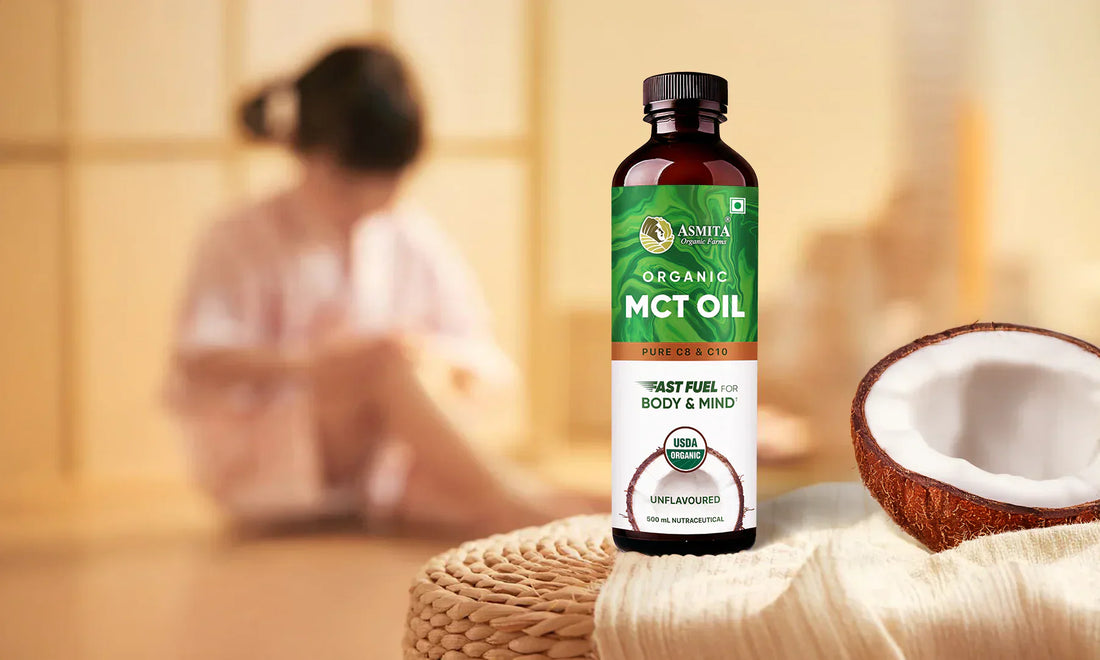Is MCT Oil Safe for Babies? Benefits & Guidelines
5 min read
Parents today are constantly navigating new health trends, and one that’s gaining attention is MCT oil for babies. Originally popular in keto and athletic diets, MCT (medium-chain triglyceride) oil is praised for being easily digested and quickly converted into energy.
But when it comes to infants, nutritional needs are delicate, and not every “superfood” is automatically safe. Before adding MCT oil to your baby’s meals or formula, it’s important to understand how it works, its potential benefits, and any risks involved.
In this guide, we break down the science, safety considerations, and expert recommendations for introducing MCT oil in a baby’s diet.
Table of Contents
1. What is MCT Oil?
2. How MCT Supports Baby Nutrition
3. MCT Oil for Digestive Support
4. Medical Use Cases in Infants
5. How Safe is MCT Oil for Babies?
6. Choosing the Right MCT Oil
7. Bottom Line
What is MCT Oil?
MCT oil, or medium-chain triglycerides, is a kind of fat that is obtained predominantly from coconut oil. In contrast to most cooking oils, which contain long-chain fats, the liver is able to readily absorb and use MCTs, making them a quick energy source, particularly for people with intestinal absorption or digestion problems.
At AOF, our Organic MCT Oil is produced using pure organic coconuts grown in Tamil Nadu without any fillers like palm oil. It's a blend of two specific medium-chain triglycerides—C8 (caprylic acid) and C10 (capric acid)— in a 60:40 ratio.
How MCT Supports Baby Nutrition
The primary nutritional advantage of MCT oil for babies lies in its easy digestibility. Unlike other fats, MCTs do not require bile salts for digestion and are absorbed directly into the bloodstream through the portal vein, providing a quick source of energy.
In fact, studies on medium chain triglycerides baby health show that in specific paediatric cases, they can:
- Help underweight babies gain healthy mass
- Provide energy for infants with higher metabolic needs
- Support growth when fat absorption is impaired
However, it’s crucial to remember that healthy fats for infants usually come from breast milk or standard formula. MCT oil should not replace these primary sources of nutrition unless advised by a medical professional.
MCT Oil for Digestive Support
Some babies, especially preemies or those with gastrointestinal issues, may struggle with fat digestion. For them, baby digestion can become a complex task, often leading to nutrient deficiencies or poor growth. Since medium-chain triglycerides are absorbed more efficiently without requiring bile acids, they become a game-changer for infants facing fat malabsorption, diarrhea, or short bowel syndrome.
In such medical cases, pediatricians might recommend products like Organic MCT Oil, which is unflavored, non-GMO, and made solely from coconuts—ensuring a cleaner source for sensitive bellies. Its easy mixability into purees or milk (when permitted by a healthcare professional) makes it even more convenient.
But again, these interventions are designed and monitored by neonatal specialists, not self-administered at home.
Medical Use Cases in Infants
It’s important to note that coconut MCT oil for baby is usually prescribed for specific medical conditions. Some pediatric use cases include:
- Cystic fibrosis
- Chronic diarrhoea
- Fat malabsorption syndromes
- Premature birth with underdeveloped GI tracts
- Ketogenic diet for seizure control
For these children, MCTs act like a lifeline, supporting weight gain, improving energy availability, and reducing digestive strain. However, MCT dosage for kids should always be prescribed by a healthcare provider, considering each child’s unique needs.
How Safe is MCT Oil for Babies?
Safety is the biggest concern for parents considering MCT oil. So how much is safe?
While there is no universal dosage, typical MCT dosage for kids ranges from 0.5 to 1 teaspoon per feeding, depending on the child’s age, weight, and health condition. Excess use may lead to:
- Diarrhoea
- Stomach cramps
- Nausea or vomiting
That’s why self-prescription is not recommended. If your pediatrician recommends MCT oil, start slow and monitor closely. Gradual introduction helps the baby’s system adjust without adverse effects.
Choosing the Right MCT Oil
If your baby’s doctor recommends MCT oil, ensure the product you pick is:
- Derived from 100% organic coconuts
- Free from palm oil or additives
- Cold-pressed and unflavoured
- Tested for purity and safety
AOF Organic MCT Oil checks all these boxes. Packed in amber bottles to preserve quality, this oil is one of the few clean-label options available online in India — USDA-certified and vegan.
Here’s the best part: it’s totally flavourless and odorless, so you can stir it into your morning brew, blend it into smoothies, or drizzle it on your salad without even noticing it’s there. Think clearer mind, steady energy that lasts, and a metabolism ready to torch fat.
Bonus? It doesn’t need refrigeration, so you can stash it in your kitchen without worrying. While originally formulated for adults, its composition is gentle enough to be used under pediatric guidance.
Bottom Line
The short answer is: Yes, MCT Oil can be safe for babies, but only under medical supervision.
MCT oil for babies is not a household oil to use casually. It’s a powerful, medical-grade supplement used for specific nutritional needs. When used correctly under the guidance of a pediatrician, it can support the baby's health, aid the baby’s digestion, and promote proper weight gain and nutrient absorption.
Whether it’s for a baby recovering from surgery, facing digestion challenges, or following a specialised diet, AsmitA Organic Farms Organic MCT Oil offers fast, effective support. If advised by a paediatrician, order your bottle today and give your little one the gentle nutrition they deserve.





